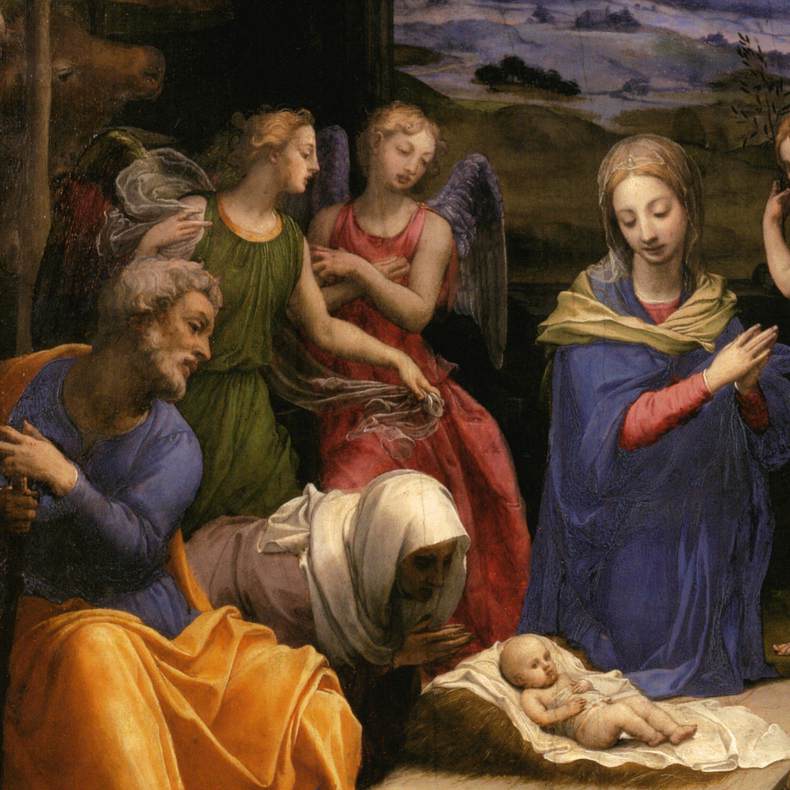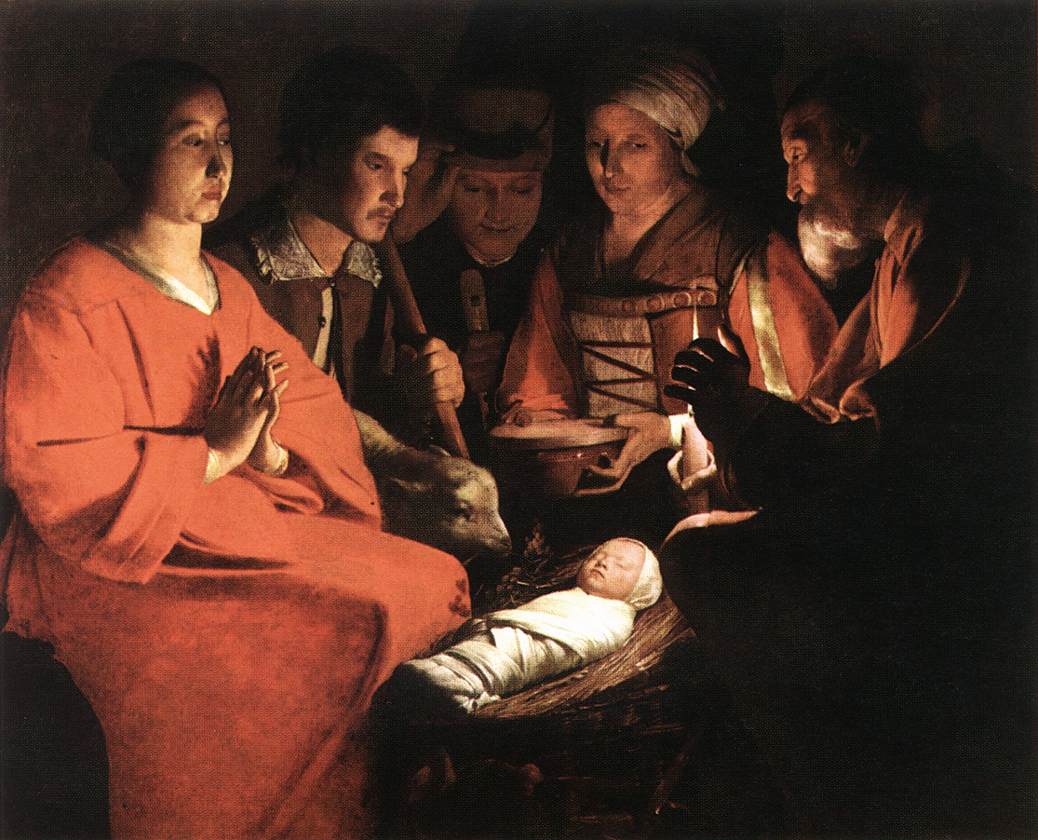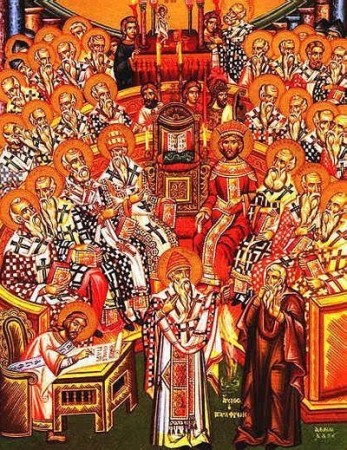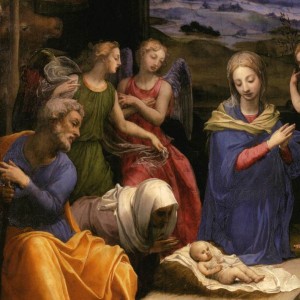Since life begins at conception, why do we focus on celebrating the Birth of Christ, rather than His Conception? After all, from a Catholic perspective, the Incarnation really occurs about nine months prior to Christmas. Indeed, pro-life movements around the world have begun using March 25 as a day celebrating the life of the unborn, during the Feast of the Annunciation, nine months before Christmas. And why do we pro-lifers throw birthday parties, instead of conception-day parties? Why do we speak of being born again? Why measure our ages from the date of our birth, instead of conception?
I. The Conception and Birth of Christ
 |
| Agnolo Bronzino, Adoration of the Shepherds (c. 1538) (detail) |
LifeSiteNews has a great article fittingly called, “If life begins at conception, why wouldn’t we celebrate the Incarnation instead of Christmas?” That’s a rather reasonable question, and LSN does a good job answering it:
To be sure, the Incarnation is celebrated in many churches, including the Roman Catholic Church and the Eastern rites, on March 25th, quite appropriately nine months ahead of Christmas. But while the Incarnation (also known as the Annunciation) is observed in such cases as a great feast, it’s certainly not afforded the solemnity and pomp of Christmas.
And that’s the way it should be, I’d say.
Conception is hidden, private, intimate. When a couple realizes they have conceived a child, they are naturally filled with joy, but that joy is held between them.
As they reveal the happy news to family and friends, or the child makes herself known by the mother’s blossoming belly, the child’s presence is revealed more and more until she is ready to declare herself to the world.
While our joy at the conception of a child is often no less than at her birth, it is usually less conscious. It takes time for this amazing gift to strike us.
So, quite naturally, we reserve our greatest celebrations for the child’s birth.
 |
| Georges de la Tour, Adoration of the Shepherds (1644) |
This is a very good answer, and one which finds plenty of support in early Christian writings. For example,
St. Fulgentius of Ruspe described Christmas as the day that “
our King, clothed in His robe of flesh, left His place in the virgin’s womb and graciously visited the world.” This description makes it clear that Christ was very much
alive in the womb before Christmas, but that He wasn’t really in the world yet.
Likewise, Scripture puts a strong emphasis on the circumstances of the birth of Christ (Lk. 2:1-20), while we know basically nothing about the time and place of His conception (Gabriel prophesies it in Lk. 1:35, but we don’t even know how quickly that prophesy came true). Nevertheless, Scripture is quite clear that Christ is alive prior to His birth (as well as John the Baptist: see Lk. 1:39-45, and
here).
II. Was Christ Eternally Begotten?
There’s a great parallel to all of this in a dispute from the early Church.
The Arians denied that God the Son was eternally begotten of the Father. Instead, they claimed that Christ became the Son at His Baptism, and pointed to passages like Psalm 2:7, Acts 13:33, Heb. 1:5, and Heb. 5:5 for support. This heresy has had a resurgence
amongst some Evangelicals; even John Armstrong
used to teach it.
 |
| 1st Council of Nicea – Arius is in brown |
This heresy may seem like a minor quibble, but it’s not. If Jesus wasn’t always the Son of God, then the core teaching of orthodox Christianity, the Trinity, is wrong. But the Arians were wrong, and the First Council of Nicea (325 A.D.) condemned them for it. The First Council of Constantinople (381 A.D.) built on Nicea by adding a phrase to the Nicene Creed explaining that Christ is eternally-begotten, or “
begotten of the Father before all worlds.” (For good measure, jolly old St. Nicholas actually
slapped Arius in the face for denying the Divinity of Christ).
The reason that we can say that the Arians were heretics is that well before His Baptism, Christ affirms His unique Sonship; this is clearest in Luke 2:49, in which a young Jesus speaks of going about His Father’s business. This is about two decades before His Baptism, yet He’s already the Son of the Father in a unique way. Indeed, throughout every statement He ever makes about the Father, Jesus calls the Father “My Father” or “your Father,” but never “Our Father,” to make clear to us that He’s the Son of the Father in a way that we aren’t (see, e.g., John 20:17). We’re adopted as sons and daughters of God (Romans 8:17), but Christ is the Only-Begotten (John 3:16)
And St. John begins His Gospel with this beautiful insight into the Trinity, and particularly of the relationship between the Father and the Son (John 1:1-3):
 |
| Andrea del Verrocchio, Baptism of Christ (1475) |
In the beginning was the Word, and the Word was with God, and the Word was God. He was in the beginning with God. All things came into being through Him, and apart from Him nothing came into being that has come into being.
So Jesus doesn’t become the Son of God at His Baptism, or even at His Birth. He’s the Son of God for all eternity, from “the beginning,” which is why God can speak of Himself in plural form clear back in Genesis 1:26.
So what’s going on with those passages which would seem to suggest He was begotten at His Baptism? At His Baptism, what was hidden to the world (that the Son of God was among them) was made visible: that’s the sense in which Hebrews and Acts say that Jesus is “begotten” at His Baptism. But He was the Son of God before this, from all eternity. Likewise, Christmas celebrates the point at which what was hidden to the world (that the Son of Mary was among us) was made visible. But Jesus was the Son of Mary before this, from about nine months earlier.
So just as we might say that Jesus was twelve years old when He went up to the Temple (Luke 2:42), measured from His birth, without literally suggesting that He didn’t exist prior to His birth, we see something similar in the way Scripture speaks of His Baptism.
Conclusion
The image that I think captures this well is of a gift under a Christmas tree. The gift is already there, and if you receive it in the mail, you already own that gift prior to unwrapping it. But the celebration is of the moment that you unwrap it, and encounter it in a certain way for the first time.
Certain things are totally private, and conception is one of them (even parents don’t know the exact moment of conception — there’s something mysterious and beautiful about the fact that it’s known to God alone). We may get excited at seeing the wrapped presents placed under the tree, knowing what they herald. But we quite reasonably celebrate the point at which the presents are unwrapped, and we come face to face with the Gift.






Why Celebrate Christ’s Birth, Instead of His Conception? eh?
We do it is called “the Feast of the Annunciation”
“To be sure, the Incarnation is celebrated in many churches, including the Roman Catholic Church and the Eastern rites, on March 25th, quite appropriately nine months ahead of Christmas. But while the Incarnation (also known as the Annunciation) is observed in such cases as a great feast, it’s certainly not afforded the solemnity and pomp of Christmas.” -LSN, quoted above.
I couldn’t think of a way of fitting all that nuance in the title, but I agree.
I didn’t mean to be snide – I know that you know.
I’m Orthodox and liturgically the Feast of the Annunciation is as important as Christmas – Easter being the superlative feast in the Church year.
To the world of course Christmas with all its tinsel seems the thing There will always be more in Church for Christmas Liturgy than for the Feat of the Annunciation.
The world is wrong on many things
Andrei,
No offense taken.
An additional layer of nuance perhaps worth considering: the Annunciation and the Incarnation are two distinct events — the former being the announcement of the latter. March 25th is the Feast of the Annunication. We assume that the two events happen nearly simultaneously, but to my knowledge, neither Scripture nor the Church has ever said as much. As of Luke 1:35, the Incarnation seems not to have occurred yet. (In fact, one of the Patristic commentaries I was reading seized on this point, noting the significance of the fact that Mary was filled with grace even prior to the Incarnation).
There’s a stereotype that the East (both Catholic and Orthodox) focuses more on the beginning of Christ’s earthly life, while the West (both Catholic and Protestant) focuses more on the end, but I’m not sure how true that is. After all, the Last Gospel in the Traditional Latin Mass was John 1:1-14, with everyone kneeling on the lines, “and the Word was made flesh and dwelt among us.” That’s a constant reaffirmation of the importance of the Incarnation.
Having said that, I do wonder if there are differences in how East and West approach this topic, or whether we view it in fundamentally the same way. Your thoughts?
I.X.,
Joe
I’ve heard way too many theologians, priests and apologists refer to Jesus’ birth as the incarnation, it needs to be cleared up…so as to help strengthen the pro life cause
I don’t know Joe – the Eastern Church celebrates “the twelve great feasts” Christmas and the Annunciation being among them but the Greatest Feast of all which is not one of the twelve is Pascha – that which you call Easter.
And in our Church anyway it is Pascha that it is the fullest, in fact you can’t hardly get in – would that it was like that every Sunday – no?
the local press however most years reports on Christmas as a kind of odd story thing – because we haven’t actually done that yet, not until January the 7th – so they can run the human interest story with the obligatory picture of an old lady or a young girl and her Mama lighting a candle – that’s the usual drill.
As for the incarnation – I’m certain it hasn’t occurred when Mary says “Behold the handmaid of the Lord; be it unto me according to thy word” but how soon thereafter? Well it is not something that needs to be dwelt upon since it has nothing to teach us one way or the other.
@Joe: Yes, Yeshua is God from all eternity (John 1:1-3, John 8:58; also Genesis 16:7,13 as one of many angel of the Lord Scriptures where the angel is revealed as Lord (“An Angel You Ought to Know” by Loren Jacobs), Micah 5:2, Daniel 7:9). That’s a given. But He is the Son of God at conception and not from all eternity (Scriptures you cited and Psalm 22:10). Doesn’t calling Jesus the Son of God before conception take away from His pre-existence as God, even slightly? If He was already the Son of God, then how does Philippians 2:5-11 or the Scriptures you cited plus Psalm 22:10 make any sense? How is “incarnational sonship”, as MacArthur put it, a heresy if it is acknowledged with Jesus being eternally God?
Good post….
I posted a similar blog earlier this week, but with a focus on understanding the Nativity in light of the Annunciation. Feel free to have a look if you are interested:
http://justingridveritasluxmea.blogspot.com/2011/12/incarnation-is-more-than-nativity.html
God bless
Justin
Michael,
Before I address your argument, can you clarify what it is that you’re actually arguing? In your view, Who or What was Jesus prior to being the Son of God?
Also, how do you deal with the passages that place the “begetting” at sometime other than at conception? For example, Acts 13:32-33 claims that Psalm 2 was fulfilled at the Resurrection, yet you claim that it was fulfilled in the Incarnation. Hebrews 1:5 and 5:5 cite Psalm 2, but don’t say when it was fulfilled. So bear that in mind when you lay out your own view on this issue that the verses you’re citing to may not say what you think they do.
I.X.,
Joe
P.S. Just to be clear, Acts 13:32-33 isn’t literally claiming that Jesus became Son of God at the Resurrection. He’s begotten then in the sense I described in the post: the Gift is opened completely at the Resurrection. Compare it with Luke 2:49 and 3:22, which bear the same human and Divine Authorship, and show that Jesus is the Son of God well before the Resurrection.
Joe- the last bit said that Jesus always said “my Father” and “your Father”‘but what about the first two words of the Lord’s Prayer? “our Father”?
Jennifer,
Look at the context of Matthew 6:9, “This, then, is how you should pray.” The “Our” is you and me, not you, me, and Jesus.
Ok, that’s what I was thinking. Sounds good to me!
@Joe:
1) “…what it is that you’re actually arguing?”
The fact that you call people heretics who don’t deny the pre-existent deity of Christ because they deny Christ as always the Son, like they were automatically Arians (your MacArthur citation).
2) “In your view… Son of God?”
I believe I made it obvious that I thought Yeshua was God from all eternity.
3) “Also, how do you deal… what you think they do.”
Yes, Acts 13:32-33 does point out a dual meaning as far as Jesus being the firstborn of the resurrection. In that view, Hebrews 1:5 and Hebrews 5:5 can also have a dual meaning. But not Psalm 22:10 or Philippians 2:5-11. So, the verses do mean what I was saying, as you admitted in your ‘P.S.’ to me.
It takes a father to have a son. To say Jesus is eternally begotten is like saying that it took God to have the Lord Jesus from all eternity, when it did not, as Scripture testifies. (With the Jesus as Son from all eternity view, no wonder Arius was all confused. That view of Jesus as eternally begotten must have been the ‘seed’ into his false doctrine.)
@micheal
I don’t mean to offend, this is an honest question based on your last response: But in what way are you trinitarian? If Jesus wasn’t God from all eternity can God be created?
Merry Christmas!
Cary
Michael,
Whether or not those who deny the eternal Sonship of Christ are Arians or not is sort of irrelevant. The Nicene Creed is one of the basic litmus tests for Trinitarianism and orthodox Christianity.
A few things related to this. First, what weight, if any, do you give to Nicea? I note in passing that the Reformers upheld it as an orthodox and accurate articulation of Christianity, but I’m not sure that this matters to you, since they were charismatics (and thus, apparently not Christians, based on your earlier comments).
Second, if you’ll forgive some uncomfortable bluntness, anyone who rejects the Nicene Creed is (by definition) embracing heresy, and rejecting the Trinity proclaimed by Christians. In other words, you’re not just disagreeing with me. You’re disagreeing with the early universal Church. Or perhaps more accurately, you’re siding against the Trinitarians. That’s because words like “Trinity” don’t just mean whatever you want them to mean. If you reject the Trinity (as defined), then just declare yourself non-Trinitarian.
Finally, claiming that the eternal begetting of Jesus is the seed of Arius’ heresy that Jesus wasn’t eternally begotten doesn’t make sense. It’s the cure to that heresy, not the cause of it.
Cary,
See his response from # 2. I think Michael is saying that Jesus was God, but not the Son of God. In which case, the Father wasn’t always the Father, nor is God unchanging. Michael, is this what you’re claiming?
God bless,
Joe
@Cary: Obviously you are confused. More than once in my comments I stated a belief in the pre-existent deity of Christ. So that said, in what way aren’t I Trinitarian?
@Joe:
1) “First, what weight…”
It holds almost no weight.
2) “the Reformers upheld it… based on your earlier comments).”
Most reformers, especially Calvinists, don’t believe in the gifts of the Spirit as being as powerful/abundant as they were with the first-century church. So those reformers aren’t outside of the church because they believed in the gifts, because most did not believe in all gifts of the Spirit.
3) “Second, if… then just declare yourself non-Trinitarian.”
Unlike the majority of Catholics, I fear God and not man, whereas the majority of Catholics fear man. Since I do so, I seek to “hear the word of God and obey it”. Since He made it obvious in His Word that He BECAME the Son, then with joy I go with the flow (so to speak). But to declare myself non-Trinitarian, come on Joe. Like I asked Cary: In what way aren’t I Trinitarian?
4) “Finally… not the cause of it.”
I was basically saying it appears (other than ‘the Father is greater than I’ and ‘one true God’ which is what falsely put the icing on the cake for him) it might of had some influence since eternally begotten was going around at the time. (Sorry, I didn’t fully explain. I’ll admit, sometimes I don’t explain myself very well whether it be typing or talking. A type of laziness, I guess.)
5) “Michael, is this what you’re claiming?”
Yes, since Jesus wasn’t always the Son, the Father wasn’t always the Father (that is, to only Jesus and the Spirit); otherwise, as an example, in OT times the Trinity is the Father of Israel (Exodus 4:22, Yeshua as Everlasting Father in Isaiah 9:6 as confirmation); not to say, in that way, Jesus isn’t Everlasting Father anymore. And yes, God is the same yesterday, today, and tomorrow.
Michael,
I’m not sure I have a great grasp of exactly what it is that you believe about the nature of the Godhead pre-Incarnation, so I’ll keep it simple. “Trinity” isn’t a term found in Scripture. It’s a term created by the Church to describe a bundle of doctrines. If you believe all of those doctrines, you believe in the Trinity. If you reject all or some of them, you don’t. Denying that the Son is eternally begotten of the Father seems to be a denial of a critical element of that bundle of doctrines. And it also raises a lot of other questions about how God can be the same yesterday, today, and tomorrow, when the Father wasn’t the Father of the Son until a particular point in human history.
I.X.,
Joe